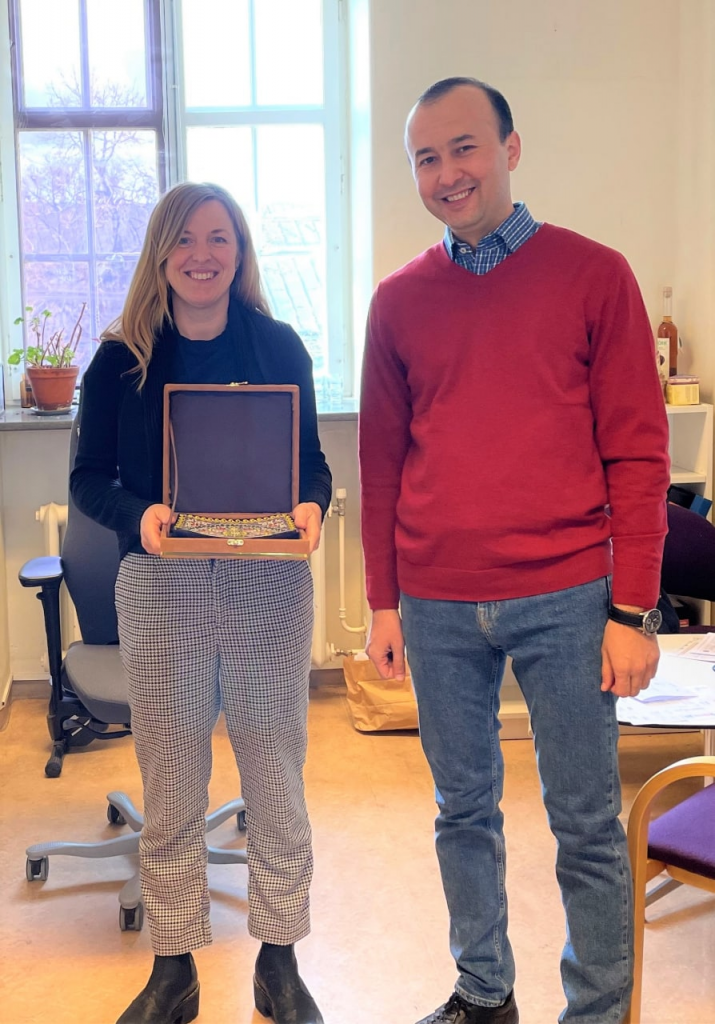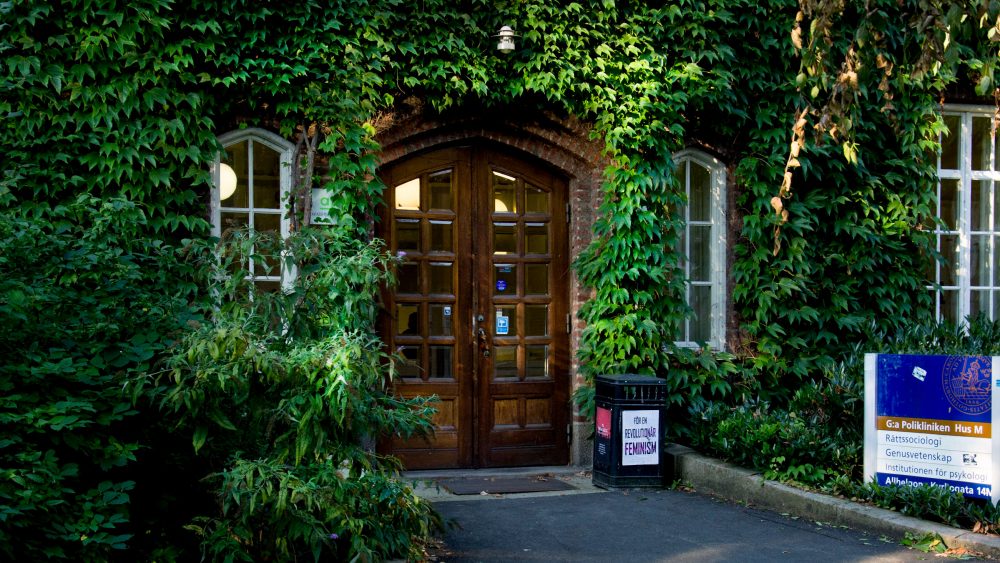In this blog post, Ulugbek Abdurakhmanov shares his secondment experience at Lund University. He also talks about his research interests, impressions of the Swedish culture, opportunities for students, as well as discusses how restrictions regarding Covid-19 affected his secondment experience.
Briefly about myself
My name is Ulugbek Abdurakhmanov. Currently I work as a head of the Masters’ programs of the Academy, I have more than 10 years of practical experience in the Prosecutor’s Office. As a lawyer, the main focus of my research is labour law.
My secondment at Lund University started from the beginning of April and will last until the end of May 2021 and was held within the framework of the project funded by the European Commission’s H2020 MSCA-RISE programme “Central Asian Law: Legal Cultures and Business Environments in Central Asia”. Doing secondment at Lund University, one of the oldest and prestigious universities in Scandinavia, provides me with a unique opportunity to enrich my academic skills and international experience.
Purpose of the secondment
Currently, the whole population of the world is witnessing an unprecedented time in our history. It is not only a unique situation in our lifetime but also perhaps a unique situation across generations, with the previous similar pandemic having taken place about 100 years ago. By the time of writing this blog in the first ten days of May 2021, almost 160 million people have been afflicted by the diseases and more than 3 million people have died worldwide. Indeed, there have been numerous terrible events that have taken place since the last pandemic but nothing that has had the global impact quite as COVID has.
In this regard, the labour market of Uzbekistan has also experienced a fundamental change, which I believe had both negative and positive impacts. Among others, the negative impacts included the uncertainty of working conditions, decreased wages and job cuts, discharging of employees for unpaid leaves, all partly due to low penetration of remote working practice across the country. Moreover, Uzbekistan, exporting around 2 millions of labour migrants annually to other countries, faced a thorny issue of low employment rate after these migrants returned back to the country.
On the other hand, popularisation of remote working (teleworking) during the pandemic could be attributed to a positive impact. Before that, teleworking has been acknowledged neither in legislature and academic circles nor by companies themselves because Uzbek organizational culture gives its priority to face-to-face interaction. Personal relationships play an important role in the advancement of the employees in an organization and promotions are based on experience and personal relationships with the supervisors.
Interestingly, after the lockdown ended, companies started to return to the traditional working pattern and it seemed that many people viewed teleworking “as a means applied during the pandemic times alone”.
Naturally, a major question arises here – should teleworking be referred to as an option of working style only during lockdowns or should it be considered as a way of improvement of job quality, increased employee satisfaction, and developing the company in a competitive marketplace? Thus, in order to thoroughly explore this area, review the existing research, and find the best theoretical and practical approaches in implementing teleworking programs within the business entities, I decided to conduct research on teleworking during my secondment at Lund University.
The flow of the research and plans

Because of the Covid-19 restrictions, I had a limited opportunity to use my workspace at the Department of Sociology of Law. But, during my one of rare visits to the department, I was very pleased to meet the Head of the Department Isabel Schoultz, and was warmly welcomed by her.
Afterward, I discussed with Rustamjon Urinboyev, a project coordinator, all issues, related to my research topic and we decided that upon gathering and reviewing the relevant literature, we would discuss important points and nuances of the topic for further development of my research project.

Needless to say that Lund University has access to EBSCO – electronic scientific database worldwide and I found that this is one of the advantages of doing secondment at Lund University which enabled me to freely access and download many articles relevant to my research. Given the fact that I could gather more than 500 articles and other electronic publications on the teleworking topic only, with some of them going back even to the early 1980s, I can imagine how one could enjoy having this access to immense scientific materials and I believe this is important for every researcher.
Getting acquainted with these materials gave me a unique insight on how to develop a concept of teleworking in the context of Uzbekistan by taking into account the peculiarities of traditional organizational cultures.
Interestingly, the debate on teleworking began in the early 1970s, at the University of Southern California, when “the father of teleworking” Jack Nilles presented the term telecommuting during a research project for the National Science Foundation, which simply meant the opportunity to work from home using telecommunication means. At the time of the oil crisis, a special demand for new ways to conserve energy was identified, and it is with this background that the author discusses the potential in the substitution of commuting by the technically possible telecommuting. This concept would be materialized as an electronic-mediated distance working, with advantages not only in saving energy but also in providing less traffic and environmental pollution, less stressful working conditions, more time for family and leisure, or the possibility of substantial savings in office costs.
Pioneers in developing and implementing teleworking programs at various levels are the US, UK, and EU, especially Nordic countries. For instance, to name but a few, in 1993 a wide network of telecottages has been established in these countries: 10 in Norway, 39 in Sweden, 44 in Finland and 10 in Denmark and employees from different companies living nearby could gather and work in one place equipped with necessary information technologies. During my secondment, I intend to visit one of the telecottages and get more information regarding their activities.
Teleworking is a many-faceted phenomenon. Within the framework of this project and based upon my knowledge I have acquired at Lund University, I am going to develop a teleworking program for Uzbekistan and in conformity with the program, we will launch a pilot project within one company to measure its advantages as well as drawbacks.
However, there is a likelihood that we may confront resistance from the top and mid-level managers, in some circumstances even from employees, which should not be excluded, because in the early stage of its implementation every country faced those obstacles, since these subjects all got used to the traditional “employer-employee” relationship. Therefore, after running a pilot project, we should design a program based on feedbacks, which should be cost-effective for the company, family-friendly for employees, and beneficial for the country in terms of less air pollution, traffic congestion, energy consumption, etc.
People’s lifestyle in Sweden
Before arriving to Sweden, I found that according to the World Happiness Index of 2020, Sweden held the 7th position and has held leading positions for a long time. After my arrival, I found out that the values of life here are different from those that we have. Of particular relevance in this regard has the term “Lagom” which according to Wikipedia means “just the right amount”. This word can be variously translated as “in moderation”, “in balance”, “perfect-simple”, and “suitable” (in the matter of amounts). Whereas words like sufficient and average suggest some degree of abstinence, scarcity, or failure, lagom carries the connotation of appropriateness, although not necessarily perfection.

A “Lagom” house in Lund: not fancy looking but livable and comfortable house
In my opinion, “lagom” exactly plays a core role in people’s perception of happiness.
“Have you seen the sunshine? No, what is that?”

When I was leaving my country, it was relatively cold but nature was gradually turning green. So, upon arrival in Sweden, I understood that I came from early spring back to the winter. It was very cold outside, cloudy almost every day with very little sunshine. As far as my homeland has a lot of sunny days during the whole year for the first time in my life, I felt happy after seeing sunshine, though a very little.
Lund city (April 5, 2021)

Weather forecast for the first week of May 2021
And as I mentioned above, we enjoyed few sunny days as well =).

“Stortorget” – the main square of Lund city
Be careful, a bicycle is coming
Bicycles are another big topic in Lund. I was told that Lund is a city of bicycles but was not informed that some maybe even invisible. Therefore, during strolling around one should be very careful because anytime a bicycle can come behind you and you may never notice it.
Summing up, I have to underline that, there is a little opportunity for in-depth research in my country because of lack of access to the e-resources. Moreover, I had an opportunity to exchange ideas with the project coordinator and others members of this project, who gave invaluable ideas on how to conduct research using various methods and achieve my research goals. Most importantly, I have gained rich academic experience in my area of interest. So, this project paved a unique way for further enhancement of my knowledge in a respective field.
Therefore, I would like to express my sincere gratitude to the Department of Sociology of Law, Lund University and the Central Asian Law project (funded by the European Commission under H2020 MSCA-RISE programme) for providing opportunities for building collaboration and networking among academic circles in Europe and Central Asia.

